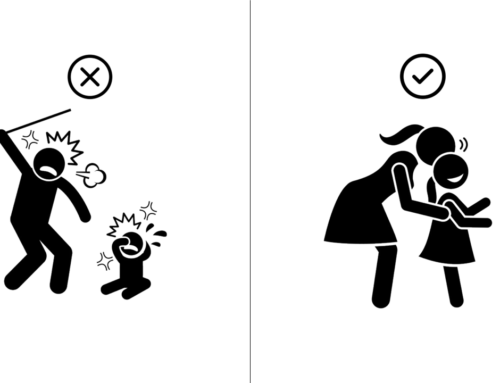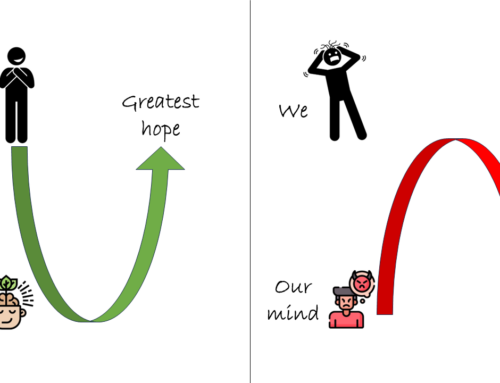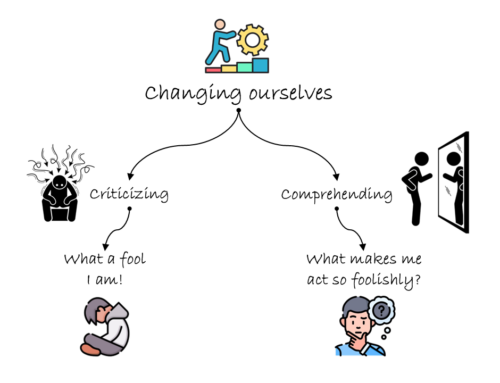No one has a right to mistreat you not even you
Suppose someone repeatedly derided us. We would be incensed: “You have no right to mistreat me like this.”
Yet we let ourselves be mistreated like this regularly, even daily. How? By listening to our mind. Inside us is our mind which mistreats us, by replaying an endless self-deprecating monologue. And we let our mind mistreat us by uncritically listening to the mind. Pertinently, the Bhagavad-Gita (06.05) urges us to elevate ourselves with ourselves and not degrade ourselves with ourselves.
A question may arise: Is self-deprecation always bad? What if we are degrading ourselves by our mistakes and misdeeds? Don’t we need to be strong with ourselves, castigating ourselves so that we will improve? Yes, we certainly need to improve, but we need to check what approach actually empowers us to improve. If our self-castigation jolts us out of our complacency and impels us to take determined steps for self-reformation, that’s productive. But if such self-castigation amounts to beating ourselves down when we are already down, demoralizing us so much that we stop even trying to rise, then that is counterproductive.
To prevent such counterproductive self-flagellation, Gita wisdom gives us a spiritual vision of ourselves. It explains that we are not our own property to mistreat. We are parts of a Whole far bigger than ourselves. That Whole is the ultimate reality, the all-loving person, Krishna. He can make each one of us as channels for his compassion, thereby doing good to us and doing good through us for the world. And we all have the right and the responsibility to become such instruments.
By seeing ourselves as parts of the divine, we can reject our mind’s self-destructive urges to mistreat ourselves. Simultaneously, we can take up the responsibility to treat ourselves spiritually, being hard when necessary and gentle when necessary – all for our and others’ all-round good.
Think it over:
- How do we mistreat ourselves?
- When is being hard with ourselves productive and when counterproductive?
- How does seeing ourselves spiritually change the way we treat ourselves?
***
06.05 One must deliver himself with the help of his mind, and not degrade himself. The mind is the friend of the conditioned soul, and his enemy as well.
To know more about this verse, please click on the image
Explanation of article:
https://www.youtube.com/watch?v=GfQR4U89hRk&feature=youtu.be
Podcast:





emotion is the conception of heart
Hare Krishna. I find that your article has a connection with the concept of self-compassion from the mental health field. As a fusion of the Bhagavad Gita concept of envisioning ourselves to be a part of the all-loving Supreme Person and the concept of self-compassion, I would like to make a humble comment about how seeing ourselves spiritually can change the way we treat ourselves.
First we could strengthen our understanding that a portion of the all-loving Supreme Person is present in my heart eternally as the Supersoul (Paramatma, and interestingly parallel to Christian concept of paraclete), and this Person is my ultimate friend. I have total trust in Him as my constant well-wishing, unfailing companion.
Once we have this firm faith, we could regularly use a meditation to invite this friend in our conscious and purposeful meditation. We could feel that this all-loving and all-powerful friend, the Supersoul, is very kind and caring. He is holding my hand and bringing me to a safe place; assuring me that so long as I acknowledge His company I am going to be safe and progressive. As devotees, we may envision Krishna’s figure, His gentle hand touching us, His charming eyes looking upon us and His deep voice conversing with us.
As you suggested, in our meditation, we would like to see ourselves as recipient of His compassion, His guidance, His protection. In His company, how could our mind beat us, mistreat us unreasonably? Hopefully, a sincere and regular meditation could nourish our mind in a way to receive only positive support for self-improvement from our mind.
Thank you. Pranam.